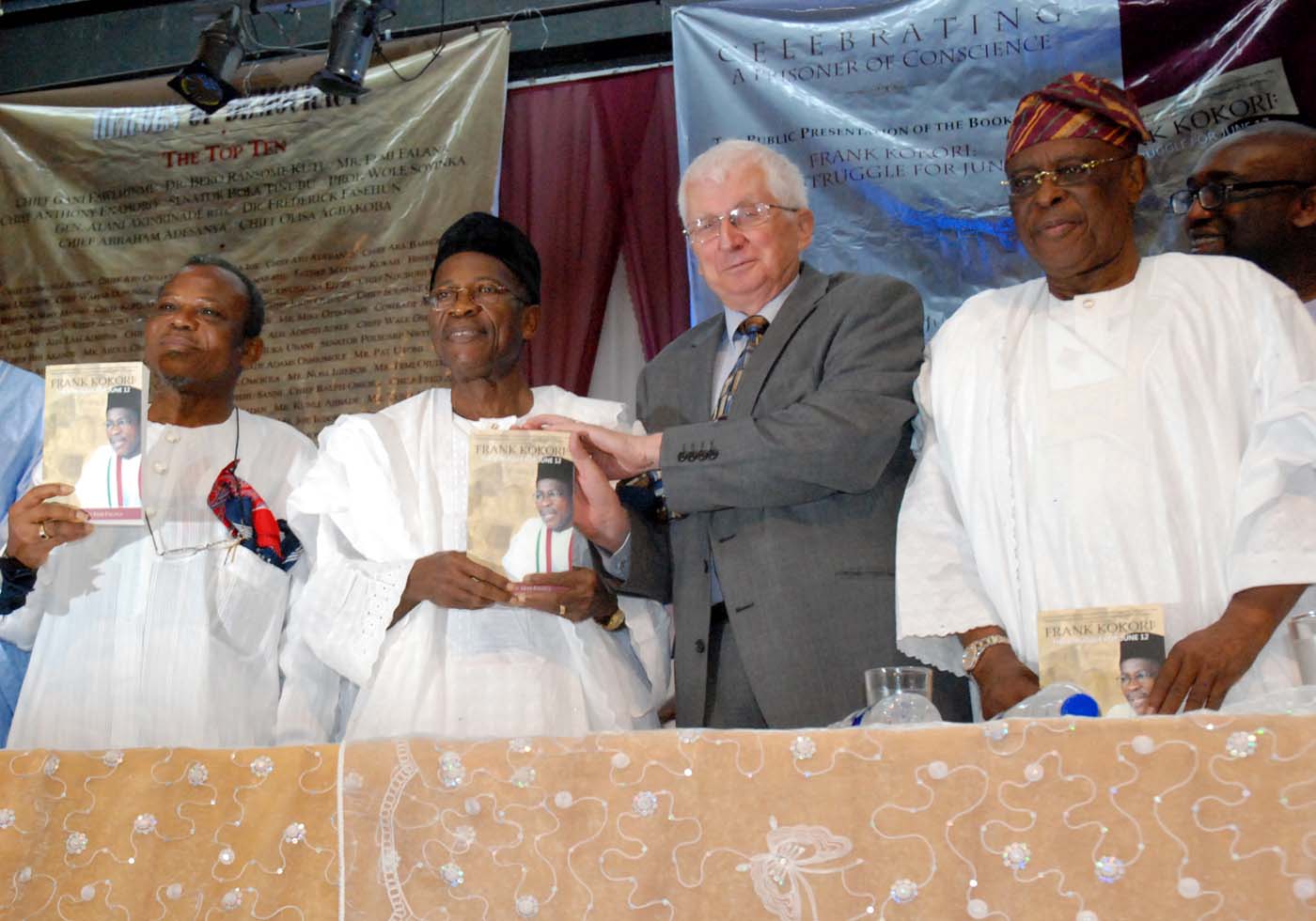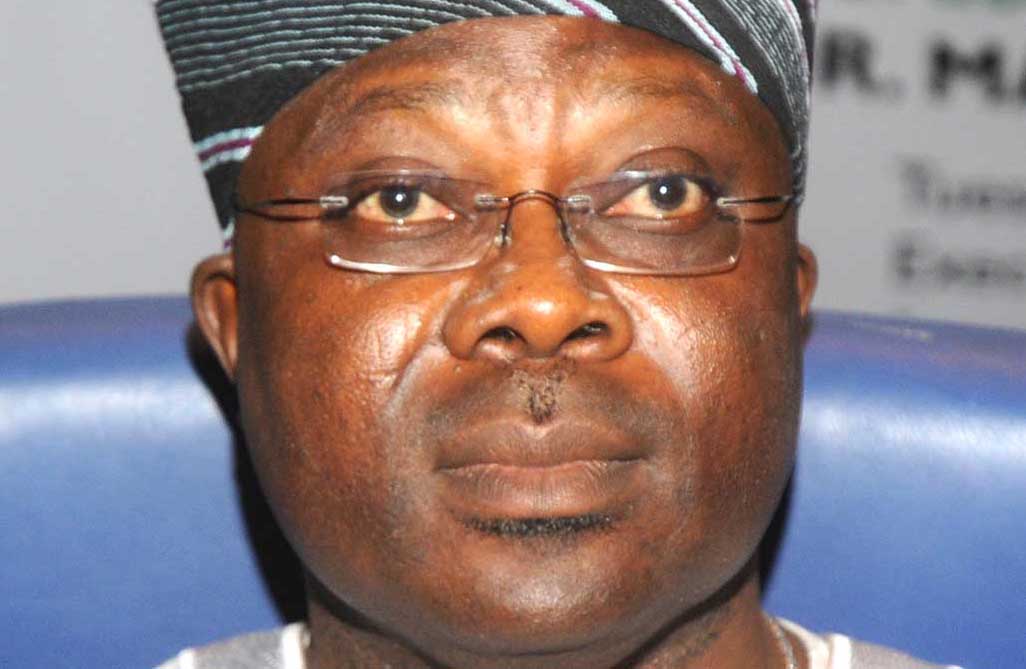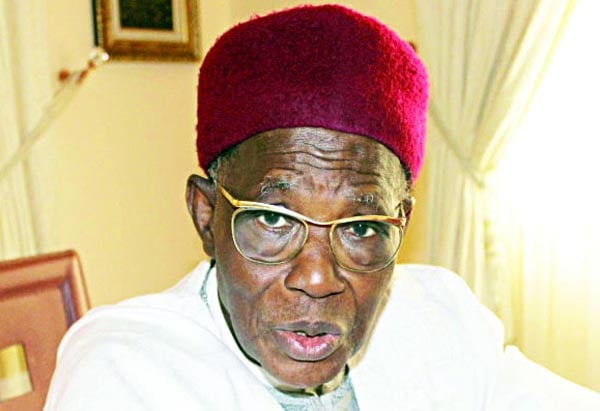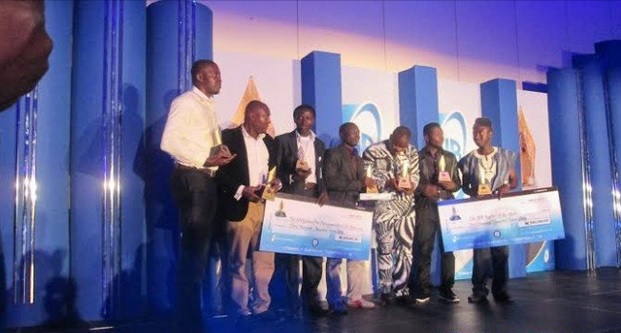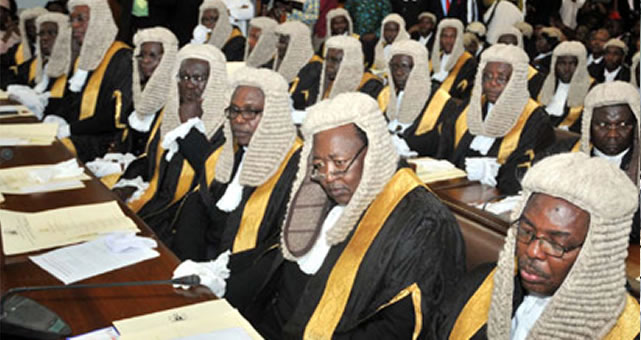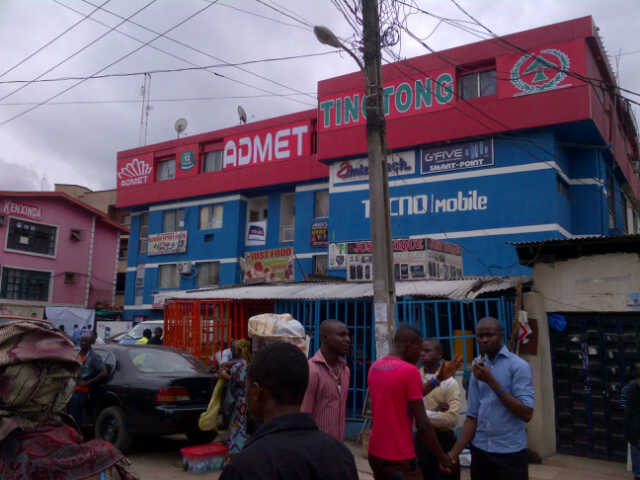A review of FRANK KOKORI: THE STRUGGLE FOR JUNE 12 by KAYODE KOMOLAFE at the launch in Lagos on June 25, 2014
One of the most inspiring quotes of the great African-American writer, Maya Angelou, who died a few weeks ago, goes like this: “Courage is the most important of all the virtues because, without courage, you can’t practice any other virtue consistently.” The wisdom condensed in Angelou’s statement is efficiently demonstrated in the book under review.
The author himself describes the book as a “testament” and a good reader will inevitably encounter sober lessons about courage as a virtue in the book. It is also significant that the book, which the author, Comrade Frank Kokori, says is 14 years late in coming, is being published to celebrate the 70th birthday of this remarkably urbane labour leader who has been made indelible, progressive interventions in the politics of his country. In his career, Kokori has demonstrated that he is first and foremost a man of organisation. A general without an army could not have fought the epic battles he fought so gallantly and selflessly.
Advertisement
For the avoidance of doubt, there was an important background to be found in Kokori’s pre-June 12 political involvements. As an accomplished and powerful General Secretary of NUPENG, Kokori was nominated to be part of some of the bodies that prepared groundwork for the wild experiments embodied the political transition programme of President Ibrahim Babangida. Kokori was a member of the 1987/1988 Constitution Review Committee and the subsequent 1988/1989 Constituent Assembly headed by Justice Anthony Aniagolu and which debated the stillborn 1989 Constitution of the Federal Republic of Nigeria. He later emerged as the National Financial Secretary of the Social Democratic Party (SDP) under the leadership of Ambassador Babagana Kingibe as party chairman.
Besides, Kokori does not belong to the school of economism in the labour movement. The proponents of economism insist that labour has no business in politics; workers’ struggle should stop at the realm of industrial relations. The debate on this will surely continue in the labour movement, but advocates of “labour in politics and politics in labour ” will readily cite Kokori and his NUPENG and PENGASSAN comrades on a positive note to justify their argument just as the legendary Michael Imoudu and his comrades are remembered fondly for their combative role in the anti-colonial struggle. Future historians will examine the significance of the 1945 strike just as they will seek to know the import of the 1993/1994 strikes.
The book is essentially a full disclosure of the audacious role played oil workers in the struggle to uphold the sanctity of the June 12, 1993 presidential election won by Bashorun Moshood Abiola. During the historical moment, Kokori was the General-Secretary of the National Union of Petroleum and Natural Gas Workers Union (NUPENG). Together with the Petroleum and Natural Gas Senior Staff Association of Nigeria (PENGASSAN), NUPENG provided the dynamite for the struggle with crippling strikes. The June 12 story could be encapsulated as follows: A presidential election that was to be the climax a long-winding political transition programme was held on June 12, 1993. Abiola as a candidate of the Social Democratic Party (SDP) contested against Alhaji Bashir Tofa of the National Republican Convention (NRC). As the results of the elections were being put together, Babangida, whose regime organised transition programme, annulled the elections. But an idea that could not be killed had been born. The resistance against the grand assault on the people’s will began in earnest.
Advertisement
In the process, Babangida was forced out of power leaving behind a rickety interim governmental structure headed by Chief Ernest Shonekan with General Sani Abacha in charge of Defence. As predicted, Abacha sacked Shonekan’s government three months later and inaugurated a reign of terror on the country for five years. In a bid to kill the June 12 idea the junta arrested Abiola, and he died in detention. Kokori was also incarcerated for four years for the bold and committed leadership he gave for the effective oil workers’ strikes. Many people were killed and several others were detained or jailed. Abacha died suddenly on June 8, 1993 and Abiola also died on July 7 the same year. That is the story in the simplest form one can put it.
However, when you read books already published on the crisis that the annulment of the election generated, you would discover that the story is indeed a complex one. Just like the civil war, the literature of June 12 is expanding. Indeed our author has thrown a challenge that his book should “provoke more books” on the June 12 phenomenon.
In telling his story, Kokori has approached the period of Nigeria’s history covered from a perspective different from those of earlier publications. At least, the perspective of the book is quite distinguishable from that of the Humphrey Nwosu’s”Laying the Foundation for Nigeria’s Democracy: My Account of June 12, 1993 Presidential Election and Its Annulment” and Omo Omoruyi’s “The Tale of June 12: The Betrayal of the Democratic Rights of Nigerians in 1993.” Professor Nwosu was the chairman of the electoral commission that conducted the election while Omoruyi, as chairman of the Centre for Democratic Studies, was one of the theoreticians of the Babangida’s transition programme. In their respective tales, the two eminent scholars offered theoretical explanations of the tragedy of June 12.
However, on a refreshing note and without any pretext to a methodological rigour whatsoever, “Frank Kokori: The Struggle for June 12″ is a hard-boiled narrative by a man who made an enormous sacrifice for June 12. The story is told lucidly with some pages reading like a thriller. Events that happened over two decades ago came alive on the pages of the book with Kokori’s animated style. He reported June 12 warts and all thereby providing a veritable primary source for those who may be interested in further research. It is indeed a frank story told by Frank Kokori. Kokori’s prison notes, letters exchanged between him and his family as well as his random reflections on the Nigerian condition are embodied in the book. He acknowledges the support of his wife and children in the struggle. You will even find the author’s attempt at some poetry. All told, readers will probably be surprised that book is not all brimming with anger and bitterness. Some pages are also laced with humour. While he is unsparing of the political enemies, he is sometimes critical of friends. What he writes about himself would even sometimes make you chuckle at him.
Advertisement
Significantly, Kokori also takes the opportunity of the book to pay passionate tributes to heroes of the struggle for democracy. In acknowledging the martyrdom of Abiola and his wife, Kudirat, who was murdered on June 4, 1996, he provided detailed information on the dynamic of the struggle. For instance, on leaving Abacha’s house in Ikoyi after a meeting facilitated by Kingibe, Kokori was surprised that his phone rang, and it was Abiola telling him to “cooperate” with Abacha who was tragically believed at that to be working for June 12 in the Shonekan’s interim government. He deliberately refers to Abiola in the book as president-elect. His admiration is especially evident for the courage and commitment of Gani Fawehinmi, Beko Ransome-Kuti, Wole Soyinka, Anthony Enhoro, Bola Tinubu, Femi Falana and other great fighters for freedom and human progress. With the rich and sharp insights in the book, it is far from being hyperbolic to say that Kokori has at last offered posterity the untold story of June 12. In the process, he has solved not a few riddles and filled in some gaps in the June 12 story.
Take, for instance, the story of his arrest on the night of August 19, 1994 during the strike, which Abacha found tough to break for some time. For long, the erroneous story that went round even within the pro- democracy movement was that the great reporter who later became Ogun State governor, Chief Olusegun Osoba, was the one who lured Kokori from his hideout to be nabbed by security men. Kokori states explicitly that Osoba was never culpable. Rather, it was Fred Eno, a man often described in the media during the struggle as “personal assistant” to Abiola, who gave Kokori a call, inviting him to the point where he was arrested. Kokori says: “As far as I know, Osoba did not betray me. I don’t know the brains that planned the betrayal, but I know the person who lured me out of the hideout – and it was not Chief Segun Osoba.” Eno later told Kokori he was not the person who lured the NUPENG leader to the hands of his captors and that his voice was mimicked. Kokori is not convinced by Eno’s denial.
Indeed, some readers may even find out that Kokori is honest to a fault in his narrative with his matter-of-fact approach. It is intriguing that as a fighter, Kokori is an adroit negotiator. But his language and methods are hardly diplomatic. Kokori tells it as it is; not minding even if his own ox is gored. Here are some samples: First, in a meeting with Abiola shortly after the annulment to plan for the struggle that was to follow, Kokori told the president-elect: “You rich people always have people cringing before you, and so people sit down for hours before seeing you. I do not have that kind of time. I am a union man all my life. If I want to see the MD of Mobil, Shell or NNPC, I get to his office and see him within two minutes. If we must work together, you must be able to give the quick attention.”
Secondly, Abacha’s Minister of Petroleum, Don Etiebet, came to Kokori’s house to convince him on why a strike should be called off. Etiebet issued a subtle threat of “government can do”, and Kokori asked him to get out of his house. Etiebet promptly withdrew his threat, and the dialogue continued afterwards. Thirdly, at a dinner with Shonekan, Kokori gave the Head of Interim Government a piece of his mind: “Sir, I have nothing against you. What we have in place now as a government is best called usurpation of someone else position. You did not contest any election. The man who won the election is there, and he has not been given his mandate. You have taken over, and it is not fair.” And Shonekan replied: “Mr. Kokori, if you are not going to support me, please, don’t fight me, so I can carry out my economic policies.” Such sharp and spicy anecdotes abound in the book.
Advertisement
The reader will also find enthralling Kokori’s views on other actors – the Nigerian bourgeois politicians and his fellow labour leaders especially former Nigeria Labour Congress (NLC), Comrade Paschal Bafyau. According to Kokori, Bafyau led the labour centre to develop cold feet about June12 because the NLC president was not made the running mate to Abiola. Kingibe receives a lot of Kokori’s attention in the book. Kokori has had a long and engaging political relationship with Kingibe. This has exemplified his admixture of excitement and frustration with politicians. He alternates between kudos and knocks for his good friend, Kingibe, who has disappointed him not a few times.
For instance, while Kingibe as Abacha’s interior minister could not meet Kokori in Bama prison, much less secure his release, he at least ensured that a relatively more convenient cell was constructed for him. This sense of disappointment with the establishment was further reinforced after his release from detention 1998 in his encounters with General Abdulsalami Abubakar who succeeded Abacha and finally organised a transition programme on which the Fourth Republic is based; President Olusegun Obasanjo, who calls Kokori his prison “senior”; President Umaru Yar’Adua’s government in which Kingibe was the link and President Goodluck Jonathan. In all these interactions with establishment figures, Kokori’s political naivety was patently on display as Comrade Femi Falana rightly observes in a perceptive forward to the book.
Advertisement
As a matter of fact, long before the politics of June 12, Kokori had nursed the ambition of writing his memoir as a labour leader to be entitled “NUPENG is My Life.” That proposed book is now subsumed in this June 12 book. In effect, there are books abridged within this important book.
This book, written by a major actor in the June 12 struggle, should be read by all those seeking for insights into what happened at that period of Nigeria’s turbulent political history.
Advertisement
*Komolafe is a journalist and newspaper columnist
Advertisement
